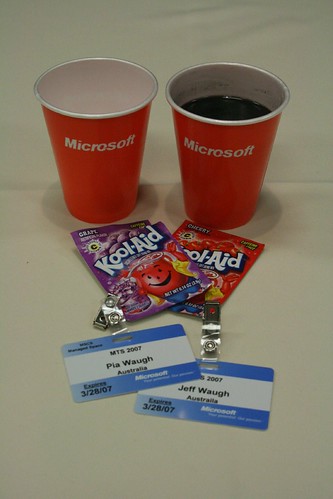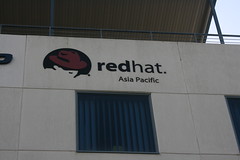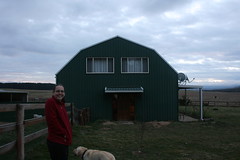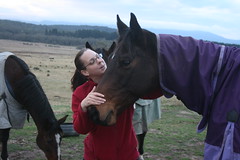A couple of weeks ago Jeff and I had a very interesting experience. We were invited to the 2007 Microsoft Technology Summit at Redmond. It was a small event with about 50 or 60 people from all walks of technology, and I think about 1/3 of the attendees had been invited due to their understanding on Open Source, so there were some familiar faces. Jeff and I were certainly curious to get inside Microsoft and talk to the technical people working with Open Source there.
Firstly it must be said that Microsoft are excellent hosts. They paid for our accommodation, flights, travel and all meals. They looked after us very well and it was a very pleasant trip. We even got some sunshine in Seattle, so thank you to Charles Sterling who invited us, and Nigel Watson who arranged all our travel. Both are Microsoft developer evangelists and great guys.
The summit consisted of talks by Microsoft people, including Bill Hilf and Sam Ramji. Sam runs the Open Source lab, and Bill is General Manager of Platform Strategy, started the Open Source lab and now also runs the Get the Facts campaign. There were other talks about SOA, IE7, Xbox, PowerShell and a whole bunch of stuff which was largely unrelated to our work. The talks were interesting, particularly as I haven’t really been involved deeply in Microsoft technologies for a few years, however I also spent some time in discussions unrelated to the agenda.
Some of the talks would start with Microsoft technology and then at the very end say “by the way, here is how it is better than (insert Open Source equivalent)”, which seemed a little patronising. I guess they were trying to change out minds. This was most evident in the IIS talk where at the very end the guy started seriously bagging out Apache, much to the amusement of several attendees who debated his opinion.
Bill Hilf had been talked up by several notable Open Source characters, including Tridge, however his talk (which launched the Summit) was very disappointing. It was arrogant, limited, and appeared to miss the larger picture of Open Source. He talked about how they are focused on Open Source only as a development model and business model, which would be fair enough, however he went to to rant about how he is not running a “jihad”, that Open Source is “writing and licensing software. That’s it. It isn’t freedom, it isn’t a movement”, and how he’s just here to sell licences. I questioned Bill and Sam on the sustainability of a strategy only seeing Open Source as a mechanism for driving licence revenue, as every successful company building revenue around Open Source has multiple revenue models and usually a strong services approach.

Bill’s been drinking the Kool Aid…
Sam strongly debated whether it was even possible to build a sustainable business on Open Source. Unfortunately he just didn’t seem to understand that there is already an entire industry built around Open Source that is doing very well. He used Oracle as an example of the problem. He thought it preposterous that Oracle would take RHEL, build services around it and sell those services even though they didn’t build the product. However, this is explicitly allowed under many of the Open Source licences we use, which is understood to drive an open market competing on value rather than locked down to a single supply chain.
When asked about standards Bill said that Microsoft are not interested in pushing a standard, but rather selling a product. Bill and the other Open Source people in Microsoft referred often to Open Source being used as a technology weapon by competitors such as IBM, which I guess is in many ways true, however I think they’ve let this opinion interfere with their ability to see beyond that and to why people are starting to care about Open Standards. When asked why they don’t just support ODF, Bill made some comments about how it wasn’t as easy as that and it isn’t just a standard but a whole product. The ensuing discussion driven by the Malaysian guys who are strong Open Standards proponents was almost comical as Bill simply didn’t answer their questions usefully. Sam said that it was likely MS Office would eventually support ODF as the market demands it.
Sam and Bill both also made the unfortunate mistake of painting any Open Source people who didn’t comply exactly with their views as fanatics and extreme, which isn’t a great way to endear them to the community. I had to really sit Sam down and say every time you compare the vast majority of Open Source people to fanatics, you are only making it harder for yourself to successfully participate. He was, to his credit, open to constructive criticism. I can understand his position being in between a rock (Microsoft) and a hard place (the community), however I think for him to succeed he and his team really need to keep grounded through keeping in touch with the community.
I also noticed most of the Microsoft people who mentioned Open Source differentiated between Open Source and commercial software, which was very frustrating considering how much Open Source is used, sold and supported commercially. The guys we mentioned this to were open to the issue and said they would try to fix this mistake.
I really think that Microsoft have come a long way from only a few years ago when Open Source was a “cancer”, and the Open Source people did say that every time Steve Ballmer opens his mouth about Open Source it hurts them, so I think they are doing quite a good job. I would strongly encourage them to participate more in the community so they can keep an open mind to Open Source beyond the Microsoft party line. Also I think unless Microsoft can see that there is value to Open Source beyond the development model, then they are severely limiting their understanding and missing the bigger values of Open Source economically and socially. There is certainly value to an Open Source approach when it comes to trustworthy systems through transparency (for example in electronic election systems, where access to the source code is really important to a trusted system) and sustainability through Open Standards. An open platform and approach drives innovation, competition, value and ultimately more freedom down the line. Unfortunately for them, Microsoft either doesn’t understand or doesn’t want to understand this.
Microsoft unfortunately regard an Open Standard as something they create inhouse and publish for others to comply to them, and open community as building a new community for other people and projects to join. They haven’t yet appeared to understand that Open Source is about active participation, not about creating yet more silos.
I guess although we found in the Microsoft Open Source labs some knowledge about some Open Source technologies, we were quite disappointed with the limited views held about Open Source, openness and community.
Software freedom isn’t just an idealistic philosophy. It is a commitment to technology openness and freedom which is increasingly important when so much of our lives is based on and possibly limited by the technologies we use to vote, communicate, create, share and work. Luckily this is becoming more understood by the general population. People like Cory Doctorow are driving the charge on protecting consumer rights when it comes to a digital age. Companies like Microsoft can choose to embrace a more open approach, one that will maintain the rights of software users and developers rather than locking them in to proprietary data formats, DRM, vendor lock-in or worse. Or they can choose to be left behind.
Other blogs and interviews on the event from other OSS people:
Links of interest:
- Port 25 – a community project by Microsoft about Open Source run by the Microsoft Open Source lab crew.


















